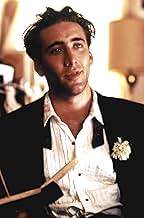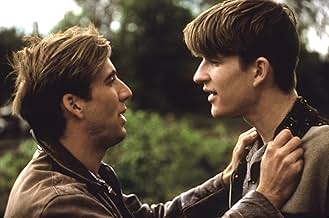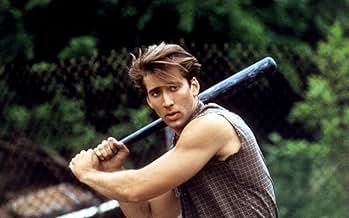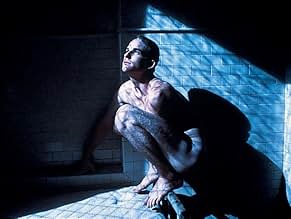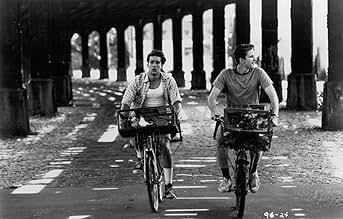AVALIAÇÃO DA IMDb
7,2/10
26 mil
SUA AVALIAÇÃO
Depois que dois amigos voltam para casa da Guerra do Vietnã, um deles se torna mentalmente instável e obcecada em se tornar um pássaro.Depois que dois amigos voltam para casa da Guerra do Vietnã, um deles se torna mentalmente instável e obcecada em se tornar um pássaro.Depois que dois amigos voltam para casa da Guerra do Vietnã, um deles se torna mentalmente instável e obcecada em se tornar um pássaro.
- Direção
- Roteiristas
- Artistas
- Prêmios
- 3 vitórias e 1 indicação no total
Pat Ryan
- Joe Sagessa
- (as Robert L. Ryan)
Maud Winchester
- Doris Robinson
- (as Maude Winchester)
- Direção
- Roteiristas
- Elenco e equipe completos
- Produção, bilheteria e muito mais no IMDbPro
Avaliações em destaque
Birdy is a difficult film to describe. It's about the developing friendship between Al (Nick Cage) and Birdy (Matthew Modine), but it's also about a descent into madness, and the lengths to which Al goes for his friend.
The film starts in the late 60's, in a US military mental hospital. Cage has been seriously wounded, and has had reconstructive surgery on his face, but he's been brought in because Birdy is here. He's uncommunicative and appears to recognise no one, spending all day squatting on the floor of his cell squinting up at the window.
The story is mostly told in flashbacks, either Al recounting incidents in their growing friendship as neighbourhood kids or, later, Birdy remembering other incidents. From the start the two are pretty dissimilar - Al is athletic, outgoing and popular while Birdy is quiet and introverted - a typical nerd. The two are, paradoxically, brought together by Birdy's love of birds, and the stupid things they do - making suits out of pigeon feathers to befriend more pigeons, climbing on (and falling off) factories trying to capture more birds.
Al tries to set Birdy on a 'normal' track; they buy a wrecked car and fix it up, and head off to the beach. But Birdy is just too wrapped up in himself for this to work, and it's a wonder he doesn't alienate Al with his strange behaviour.
In the 'present', the doctor is putting more pressure on Al to get Birdy to respond; if he doesn't, then Birdy will be written off and sent to a permanent mental institution. The flashbacks continue, and it becomes clear that Birdy's love of birds has turned into an obsession, and then into the darker realms beyond that.
The final few minutes of the film cover a lot of ground; Al finally realises that Birdy is pretty well off the deep end; they both go off to fight in the war; Al gets his injury, while we see the incident that left Birdy in his present state. Meanwhile the doctor finally decides that time has run out, but Al decides he's not leaving.
The ending of the film is incredibly powerful, and it should be a criminal offence to give it away. Is it 'appropriate' to the rest of the film? I dunno - but I thought it was pretty damn good.
The film stands or falls on the performances of Cage and Modine - and, for me, it stands tall. Cage is excellent in his role, capturing the bravado of his character perfectly; but Modine is simply brilliant. During the flashbacks he portrays his nerdy character completely believably, but it's the way he handles the scenes in the asylum that amazed me. As soon as you know his obsession, it is crystal clear that he's not squatting in his cell, but perching, wishing to fly.
Alan Parker has made some great films; this might just be his best.
The film starts in the late 60's, in a US military mental hospital. Cage has been seriously wounded, and has had reconstructive surgery on his face, but he's been brought in because Birdy is here. He's uncommunicative and appears to recognise no one, spending all day squatting on the floor of his cell squinting up at the window.
The story is mostly told in flashbacks, either Al recounting incidents in their growing friendship as neighbourhood kids or, later, Birdy remembering other incidents. From the start the two are pretty dissimilar - Al is athletic, outgoing and popular while Birdy is quiet and introverted - a typical nerd. The two are, paradoxically, brought together by Birdy's love of birds, and the stupid things they do - making suits out of pigeon feathers to befriend more pigeons, climbing on (and falling off) factories trying to capture more birds.
Al tries to set Birdy on a 'normal' track; they buy a wrecked car and fix it up, and head off to the beach. But Birdy is just too wrapped up in himself for this to work, and it's a wonder he doesn't alienate Al with his strange behaviour.
In the 'present', the doctor is putting more pressure on Al to get Birdy to respond; if he doesn't, then Birdy will be written off and sent to a permanent mental institution. The flashbacks continue, and it becomes clear that Birdy's love of birds has turned into an obsession, and then into the darker realms beyond that.
The final few minutes of the film cover a lot of ground; Al finally realises that Birdy is pretty well off the deep end; they both go off to fight in the war; Al gets his injury, while we see the incident that left Birdy in his present state. Meanwhile the doctor finally decides that time has run out, but Al decides he's not leaving.
The ending of the film is incredibly powerful, and it should be a criminal offence to give it away. Is it 'appropriate' to the rest of the film? I dunno - but I thought it was pretty damn good.
The film stands or falls on the performances of Cage and Modine - and, for me, it stands tall. Cage is excellent in his role, capturing the bravado of his character perfectly; but Modine is simply brilliant. During the flashbacks he portrays his nerdy character completely believably, but it's the way he handles the scenes in the asylum that amazed me. As soon as you know his obsession, it is crystal clear that he's not squatting in his cell, but perching, wishing to fly.
Alan Parker has made some great films; this might just be his best.
Alan Parker is a British film-maker that was capable of the worst (the boring "the commitments", the insipid "evita" as well as the best (the sordid "angel heart", the vibrating "Pink floyd: The Wall". This one, "Birdy" will surely rank among his best movies. He revives a myth, a desire that always shone in men: flying but not with a plane or an helicopter, just like Icare with real wings. This is what haunts a teenager's mind whose name is Birdy. This one devotes all his free time by inventing stratagems or ways so as to be able to fly in the sky. he also has an interest in birds' social life with their habits (it's not a fate that his name is Birdy because there's the word "bird" in it). Even if he didn't win his best friend's adherence concerning these odd likings, they succeeded in striking up a strong relationship. Above all, "birdy" is this: a story of a friendship between two teenagers brought up in a Philadelphia' popular area. They're sharing jobs, free time, girls before they were parted by the Vietnam war. Parker films this relationship with its joys, its sorrows in a hearty way and make the two actors friendly. "Birdy" is also a well-regulated movie where Parker knows how to sustain the interest in the past sequences as well as present sequences (Birdy's room hospital). Furthermore, there's not a sequence where one of the two main actors is stealing to the other, the spotlight. But the movie seems easy when it denounces the atrocities of war and its disastrous consequences on young people (Cage's long monologue with Modine in his arms towards the end of the movie). These sorrowful consequences are concrete (Cage's face full of bandages) and abstract (Modine has become dumb and stays immures in his silence). Nevertheless, emotion prevails in the end and you sympathize to the two teenagers' helpless after the war. A beautiful movie and the revelation of two great actors
I can't believe I took so long to get round to seeing this AMAZING FILM!
It captivated me from the start, beautifully filmed, powerful, sensitive, funny - Incredibly acted by Modine and Cage!
I would like to thank the reviewer that warned about the animal cruelty in 1 scene - I 'think' it was just after the stray dog scene, but I fast forwarded it a littler bit, so didn't seeing anything upsetting.
This film is a must see for any avid movie lover, and yes the ended was AWESOME!
10 out 10, and i'm going on to Amazon to buy a copy.
Enjoy!
It captivated me from the start, beautifully filmed, powerful, sensitive, funny - Incredibly acted by Modine and Cage!
I would like to thank the reviewer that warned about the animal cruelty in 1 scene - I 'think' it was just after the stray dog scene, but I fast forwarded it a littler bit, so didn't seeing anything upsetting.
This film is a must see for any avid movie lover, and yes the ended was AWESOME!
10 out 10, and i'm going on to Amazon to buy a copy.
Enjoy!
(I was flipping through the channels one quiet evening at home when I stumbled across this picture, "Birdy.")
To some, the character Birdy (Matthew Modine) has an unnatural and (quite) unhealthy obsession with birds. Well, he spends most of his time with birds, has dreams of flying away from his real-world troubles, and his only friend is a neighborhood tough named Al (Nicolas Cage). So because of his obsession with birds, Birdy has to be crazy, right? So is Al even crazier for befriending him well, isn't he?
It is these questions and many more that make up the central theme of Alan Parker's superb 1984 drama "Birdy" (adapted from William Wharton's novel), a film about two crazy guys whose friendship is ultimately tested by each other's mental sicknesses. Both of their lives take drastic turns before and after they have done tours in Vietnam, and ultimately wind up in opposite ends of the psyche ward of a state mental hospital, with Al, who's been left virtually unrecognizable by his facial bandages and Birdy, who's stuck in a catatonic state as a result of an accident out on the killing fields.
It is also the feelings of isolation between the two that brings them together, as flashbacks during their stay help to emphasize their emotions. Birdy, feeling like he is the only one that understands his bird "dream," may in actuality be the only "sane" character in the whole film. Al, who is injured from a shell explosion, questions who he is because he's not even sure who it really is underneath the bandages on his face. And it is liberation, whether it be physical or mental, that is expressed greatly by the film's ending, and Birdy's eventual coming to grips with his own current predicament.
Director Parker has always made it a point of capturing human suffering on celluloid, and this has been the main subject in a number of his films, including "Midnight Express" (1978) and "Angel Heart" (1987). Here, his subject matter is fairly lighter than those films, since the audience is spared the really intense mental anguish that accompanied "Express" and the graphic carnage of "Angel."
There's a kind of deep spiritual undercurrent flowing through "Birdy," which is most apparent by the lead character's fascination with his quarry birds. To him, birds represent freedom, a kind of freedom that can only be obtained by literally taking to the skies, and soaring high above all his problems (fans of Terry Gilliam's political satire "Brazil" should take notice here). This of course leads to the film's profound ending on the mental hospital's rooftop, where Al and Birdy must make a desperate choice choose freedom, or choose confinement of the body, or of the psyche.
I won't reveal any more than those close details but you'll have to see what happens for yourself. It really caught me off guard and in a lesser movie might seem tacky, but the way Parker and the actors handle just makes the on-screen action that much more moving. But you can be sure of this: Birdy flies. And "Birdy" does fly into underrated classic movie status because of its performers and director Alan Parker's direction.
10/10
To some, the character Birdy (Matthew Modine) has an unnatural and (quite) unhealthy obsession with birds. Well, he spends most of his time with birds, has dreams of flying away from his real-world troubles, and his only friend is a neighborhood tough named Al (Nicolas Cage). So because of his obsession with birds, Birdy has to be crazy, right? So is Al even crazier for befriending him well, isn't he?
It is these questions and many more that make up the central theme of Alan Parker's superb 1984 drama "Birdy" (adapted from William Wharton's novel), a film about two crazy guys whose friendship is ultimately tested by each other's mental sicknesses. Both of their lives take drastic turns before and after they have done tours in Vietnam, and ultimately wind up in opposite ends of the psyche ward of a state mental hospital, with Al, who's been left virtually unrecognizable by his facial bandages and Birdy, who's stuck in a catatonic state as a result of an accident out on the killing fields.
It is also the feelings of isolation between the two that brings them together, as flashbacks during their stay help to emphasize their emotions. Birdy, feeling like he is the only one that understands his bird "dream," may in actuality be the only "sane" character in the whole film. Al, who is injured from a shell explosion, questions who he is because he's not even sure who it really is underneath the bandages on his face. And it is liberation, whether it be physical or mental, that is expressed greatly by the film's ending, and Birdy's eventual coming to grips with his own current predicament.
Director Parker has always made it a point of capturing human suffering on celluloid, and this has been the main subject in a number of his films, including "Midnight Express" (1978) and "Angel Heart" (1987). Here, his subject matter is fairly lighter than those films, since the audience is spared the really intense mental anguish that accompanied "Express" and the graphic carnage of "Angel."
There's a kind of deep spiritual undercurrent flowing through "Birdy," which is most apparent by the lead character's fascination with his quarry birds. To him, birds represent freedom, a kind of freedom that can only be obtained by literally taking to the skies, and soaring high above all his problems (fans of Terry Gilliam's political satire "Brazil" should take notice here). This of course leads to the film's profound ending on the mental hospital's rooftop, where Al and Birdy must make a desperate choice choose freedom, or choose confinement of the body, or of the psyche.
I won't reveal any more than those close details but you'll have to see what happens for yourself. It really caught me off guard and in a lesser movie might seem tacky, but the way Parker and the actors handle just makes the on-screen action that much more moving. But you can be sure of this: Birdy flies. And "Birdy" does fly into underrated classic movie status because of its performers and director Alan Parker's direction.
10/10
Birdy (Matthew Modine) is the weirdo kid in a working class Philadelphia neighborhood. Al Columbato (Nicolas Cage) becomes his friend. Birdy introduces Al to his love of pigeons. They're both sent to Vietnam. Birdy returns in psychological distress after a month MIA. Al returns after suffering wounds to his face. Birdy's doctor finds Al to help in his treatment.
These are two great performances. Matthew Modine transforms physically and also mentally. Cage is the conduit between the audience and Birdy. He's not necessarily in the easier role at the least. They're both equally amazing. This isn't a movie about big plot developments. It's watching the obsessive Birdy going deeper and deeper into the rabbit hole.
These are two great performances. Matthew Modine transforms physically and also mentally. Cage is the conduit between the audience and Birdy. He's not necessarily in the easier role at the least. They're both equally amazing. This isn't a movie about big plot developments. It's watching the obsessive Birdy going deeper and deeper into the rabbit hole.
Você sabia?
- CuriosidadesNicolas Cage had two teeth removed (without anesthetic) for this role.
- Erros de gravaçãoAl calls Birdy "Al" (11:08)
- Cenas durante ou pós-créditosAnimals: Perta ... Bird No. 9 Perta's Stunts ... Queepers Alfonso ... AS HIMSELF Cat ... Hobbie Dogs ... Sneaky, Willey, Ace, Prince, Tiger, Bo, Rudah, Chiggar, Tyko, Kelly, Red, Fantasy, Scooter. Seagull ... Jonathan Snake ... Monty Jungle Bird ... Horatio Pigeons ... No's. 1 to 84
Principais escolhas
Faça login para avaliar e ver a lista de recomendações personalizadas
- How long is Birdy?Fornecido pela Alexa
Detalhes
- Data de lançamento
- País de origem
- Central de atendimento oficial
- Idioma
- Também conhecido como
- Asas do Destino
- Locações de filme
- Wildwood, Nova Jersey, EUA(Atlantic City - Fairground)
- Empresas de produção
- Consulte mais créditos da empresa na IMDbPro
Bilheteria
- Orçamento
- US$ 12.000.000 (estimativa)
- Faturamento bruto nos EUA e Canadá
- US$ 1.455.045
- Fim de semana de estreia nos EUA e Canadá
- US$ 13.720
- 25 de dez. de 1984
- Faturamento bruto mundial
- US$ 1.455.096
- Tempo de duração
- 2 h(120 min)
- Cor
- Mixagem de som
- Proporção
- 1.85 : 1
Contribua para esta página
Sugerir uma alteração ou adicionar conteúdo ausente


